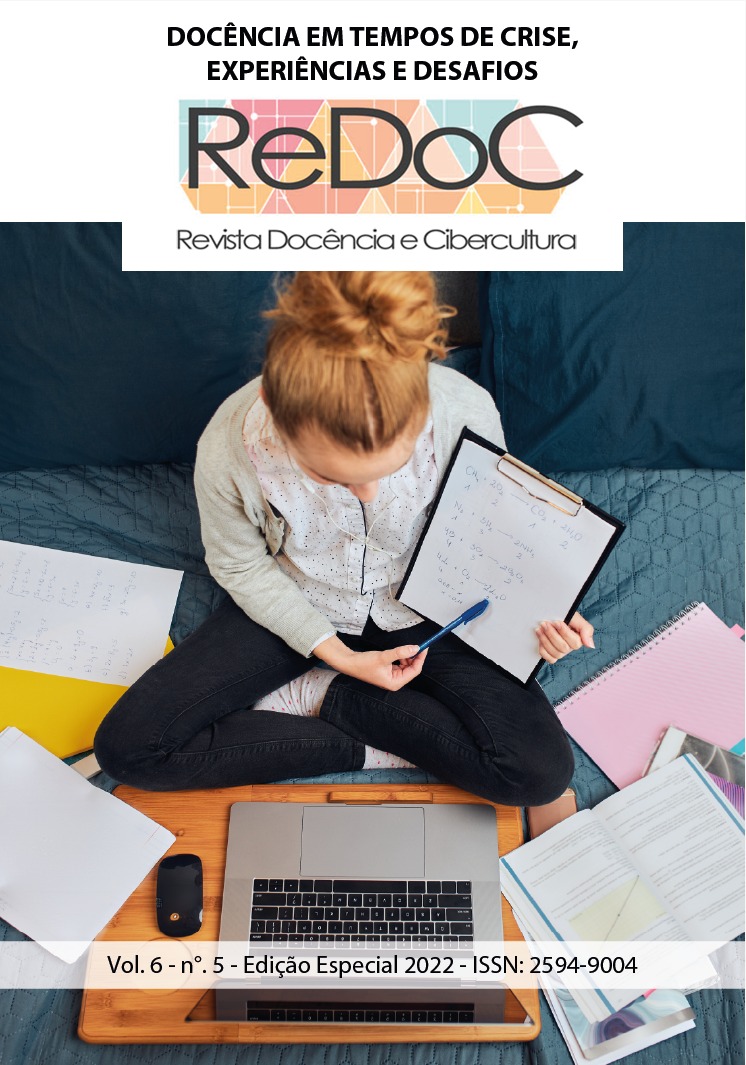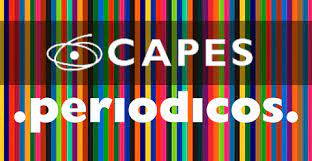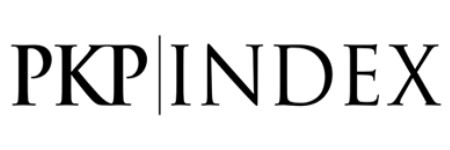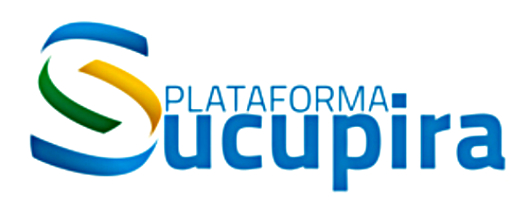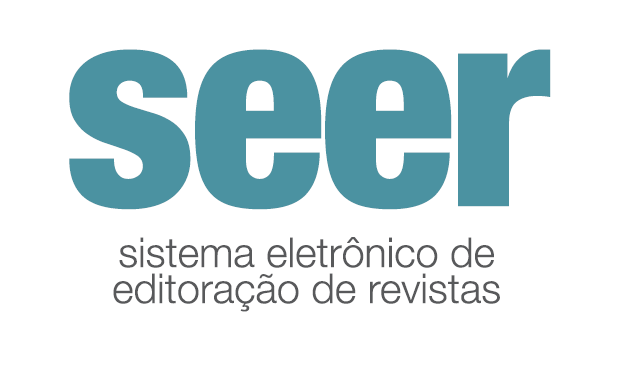MENTORING PRACTICES IN ENGLISH LANGUAGE: A SUPPORTIVE ENVIRONMENT FOR STUDENTS OF EFL
DOI:
https://doi.org/10.12957/redoc.2022.66615Palavras-chave:
English Language. Mentoring. Remote Teaching.Resumo
This paper aims to discuss the development of the teaching project Mentoring Practices in English Language: a supportive environment for students of EFL, under the effects and circumstances of the remote teaching context. Focused on the systematic monitorship of contents and related knowledge, this project seeks to offer, in the Portuguese-English language program at Felcs/UFRN, pedagogical support for students in their freshman and sophomore years who present learning difficulties related to the English Language. The report addresses aspects that underlie the work with activities that aim to improve the quality of the undergraduate course and the teacher training process: the interaction and learning space, the use of technological resources, and the approach and use of the target language linked to the development of the participants’ autonomy. This proposal is theoretically based on studies developed by Harmer (2007), Bygate (2001), Larsen-Freeman (2001), and others. Data obtained through monitoring, and dialogue with those involved during the meetings point to the importance of the pedagogical support that is provided through the mentoring project, taking into consideration the existence of gaps and weaknesses in learning, which become evident at the beginning of the educational process in Higher Education.Referências
BARDOVI-HARLIG, Kathleen; HARTFORD, Beverly Slattery. Learning the rules of academic talk: A longitudinal study of pragmatic change. Studies in Second Language Acquisition. v. 15, n. 3, p. 279-304, 1993.
BYGATE, Martin. Speaking. In: CARTER, Ronald; NUNAN, David. (org.). The Cambridge Guide on Teaching English to Speakers of Other Languages. Cambridge: Cambridge University Press, 2001.
BRINTON, Donna Mies. The Use of Media in Language Teaching. In: CELCE-MURCIA, Marianne. (org.). Teaching English as a Second or Foreign Language. 3. ed. Boston, MA: Heinle & Heinle Publishers, 2001. p. 459 - 476.
CARTER, R. Vocabulary. In: CARTER, Ronald; NUNAN, David. (org.). The Cambridge Guide on Teaching English to Speakers of Other Languages. Cambridge: Cambridge University Press, 2001.
COUNCIL OF EUROPE. Common European Framework of Reference for Languages (CEFR). [S. l.], 2001. Disponível em: https://www.coe.int/en/web/common-european-framework-reference-languages. Acesso em: 25 de Jan. de 2022.
FREIRE, Paulo. Pedagogia da autonomia: saberes necessários à prática educativa. 29 ed. São Paulo: Paz e Terra, 1996.
HARMER, Jeremy. How to teach English. Edinburgh: Longman, 2007.
INSTITUTO PENÍNSULA. Desafios e perspectivas da educação: uma visão dos professores durante a pandemia. 2021. Disponível em: https://www.institutopeninsula.org.br/wp-content/uploads/2021/10/Pulso-Volta-as-Aulas.pdf. Acesso em: 11 de Jan. de 2022.
JAMBOARD. [S. l.]: Google, 2016. Disponível em: https://jamboard.google.com. Acesso em: 25 de Jan. de 2022.
KAHOOT. [S. l.], 2013. Disponível em: https://kahoot.com. Acesso em: 25 de Jan. de 2022.
LARSEN-FREEMAN, Diane. Teaching Grammar. In: CELCE-MURCIA, Marianne. (org.). Teaching English as a Second or Foreign Language. Boston: Heinle & Heinle, 2001.
LEFFA, Vilson José. Criação de bodes, carnavalização e cumplicidade: considerações sobre o fracasso da LE na escola pública. In: LIMA, Diógenes Cândido de. (org.). Inglês em escolas públicas não funciona? Uma questão, múltiplos olhares. São Paulo: Parábola Editorial, 2011. p. 15 - 32.
LOW, Patrick Kim Cheng; ANG, Sik Liong. How to be a good teacher. Educational Research. v. 2(5), pp. 1118-1123, Mai. 2011. Disponível em: https://www.interesjournals.org/archive/er-volume-2-issue-5-year-2011.html. Acesso em 10 Fev. 2022.
MORAN, José. Metodologias ativas para uma aprendizagem profunda. In: MORAN, José; BACICH, Lilian. (org.). Metodologias ativas para uma educação inovadora: uma abordagem teórico-prática. Porto Alegre: Penso, 2018.
OLIVEIRA, Roberval Araújo de. A Matrix da LE no Brasil: a legislação e a política do fingimento. In: LIMA, Diógenes Cândido de. (org.). Inglês em escolas públicas não funciona? Uma questão, múltiplos olhares. São Paulo: Parábola Editorial, 2011. p. 79 - 92.
PADLET. [S. l.], 2012. Disponível em: https://padlet.com. Acesso em: 25 de Jan. de 2022.
PAIVA, Vera Lúcia Menezes de Oliveira. Autonomia e complexidade. In: LEFFA, Vilson José. (Ed.). Linguagem & Ensino. Pelotas, v. 9, n 1, 2006.
PAIVA, Vera Lúcia Menezes de Oliveira. Aquisição de segunda língua. São Paulo: Parábola Editorial, 2014.
SELINKER, Larry; DOUGLAS, Dan. Wrestling with 'context' in interlanguage theory. Applied Linguistics. v. 6, n. 2, p. 190-204, 1985.
UNIVERSIDADE FEDERAL DO RIO GRANDE DO NORTE. Projeto Pedagógico do Curso de Letras (Português e Inglês). Faculdade de Engenharia, Letras e Ciências Sociais do Seridó. Natal, 22 fev. 2022. Disponível em: https://sigaa.ufrn.br/sigaa/public/curso/ppp.jsf?lc=pt_BR&id=133175344. Acesso em: 22 fev. 2022.
UNIVERSIDADE FEDERAL DO RIO GRANDE DO NORTE. Plano de Ação Trienal de Curso de Graduação (PATCG). Curso de Letras (Português e Inglês). Faculdade de Engenharia, Letras e Ciências Sociais do Seridó. Natal, 22 fev. 2022. Disponível em: https://prograd.ufrn.br/documento.php?id=467030750. Acesso em: 22 fev. 2022.
Downloads
Publicado
Como Citar
Edição
Seção
Licença
Autores que publicam nesta revista concordam com os seguintes termos:- Autores mantém os direitos autorais e concedem à revista o direito de primeira publicação, com o trabalho simultaneamente licenciado sob a Creative Commons Attribution License que permitindo o compartilhamento do trabalho com reconhecimento da autoria do trabalho e publicação inicial nesta revista.
- Autores têm autorização para assumir contratos adicionais separadamente, para distribuição não-exclusiva da versão do trabalho publicada nesta revista (ex.: publicar em repositório institucional ou como capítulo de livro), com reconhecimento de autoria e publicação inicial nesta revista.
- Autores têm permissão e são estimulados a publicar e distribuir seu trabalho online (ex.: em repositórios institucionais ou na sua página pessoal) a qualquer ponto antes ou durante o processo editorial, já que isso pode gerar alterações produtivas, bem como aumentar o impacto e a citação do trabalho publicado (Veja O Efeito do Acesso Livre).

